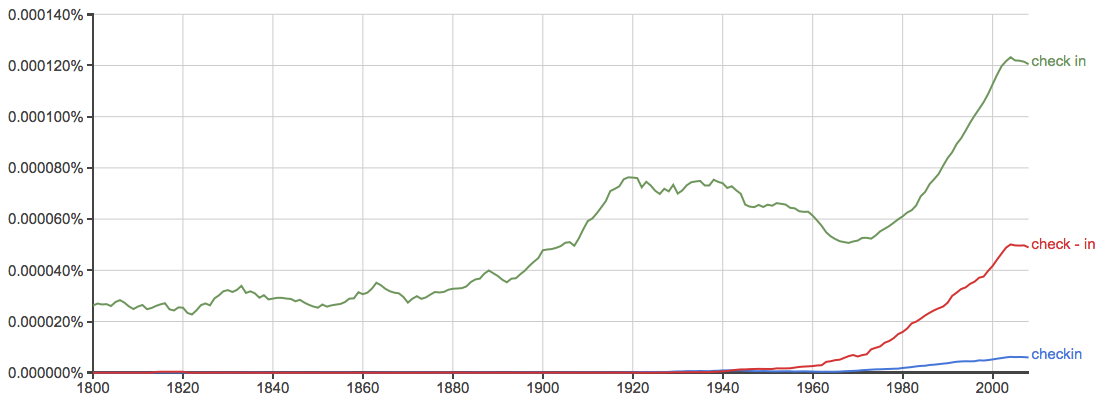Some words can be used as multiple parts of speech. Check, for instance, has several senses as both a noun and a verb. It can also be used in the phrase check in.
Check-in, a variant, adds to the versatility of this word. Continue reading to learn more about the correct usage of these phrases.
What is the Difference Between Check in and Check-in?
In this article, I will compare check in vs. check-in. I will include example sentences for each of these words to show you how they appear in context.
I will also give you a memory tool to help you decide whether check in or check-in is a better choice for your writing.
When to Use Check in
 What does check in mean? Check in is a verb phrase. It means to register upon arrival.
What does check in mean? Check in is a verb phrase. It means to register upon arrival.
Travelers check in at airports and hotels, and a supervisor might check in with an employee to verify that a project is on schedule.
For example,
- Most airlines now allow guests to check in online up to 24 hours before their flight departs.
- “Miguel, please check in with me after you get an update from the contractors,” said Christine.
- Squirrel Week continues as we check in with a Canadian photographer who goes to great lengths to get the perfect pictures of her backyard squirrels. –The Washington Post
When conjugating check in, one used the same conjugations from the word check.
In the present tense, the phrase remains check in in the first and second person singular and plural, as well as third person plural. It becomes checks in in the third person singular.
- First person present: I check in.
- Second person present: You check in.
- Third person present: They check in.
The phrase becomes checked in in the past tense, and checking in as a present participle.
When to Use Check-in
 What does check-in mean? When hyphenated, check-in is an adjective or a noun.
What does check-in mean? When hyphenated, check-in is an adjective or a noun.
As a noun, it refers to the act of registering upon arrival.
As an adjective, it describes an object used for this purpose.
For example:
- Ariel signed the check-in sheet on the lobby and entered the lecture hall to find a seat.
- “You will be charged a $50 check-in fee if you arrive after 4pm,” said the receptionist.
- The airline said it would create a new check-in process that would allow passengers to volunteer to give up their seats for compensation, and increased the limit of that compensation to $10,000 from $1,350. –The New York Times
Some writers omit the hyphen and shorten this phrase into a single word, forming checkin. Although this usage is rising, it is still several times lower than either check-in or check in.

The above chart graphs check-in vs. check in vs. checkin throughout English books written since 1800.
Trick to Remember the Difference
 Although they are pronounced identically and are only differentiated by a hyphen, check in and check-in are different parts of speech.
Although they are pronounced identically and are only differentiated by a hyphen, check in and check-in are different parts of speech.
- Use check in as a verb.
- Use check-in as an adjective or noun.
The best way to remember the correct usage of these words is to remember that the word check is itself a verb. The phrase check in contains the word check, and is also used as a verb. By remembering the meaning of its component words, you will always know when to use check in.
This difference also mirrors the difference between other hyphenated and unhyphenated words: sign up vs. sign-up, check up vs. check-up.
Summary
Is it check in or check-in? Check-in and check in seem similar, but they are different parts of speech.
- Check in is a verb phrase that means to register upon arrival.
- Check-in is used as an adjective or a noun to describe objects used for this purpose, or the act itself, respectively.
Avoid the single-word checkin.
Contents
